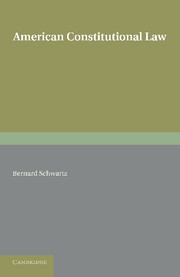Book contents
- Frontmatter
- Dedication
- Contents
- Foreword
- Preface
- PART I THE STRUCTURE
- PART II MODERN DEVELOPMENTS
- Chapter VI The New Federalism
- Chapter VII Presidential Prerogative and the Steel Seizure Case
- Chapter VIII The Changing Role of the Supreme Court
- Chapter IX The Negro and the Law
- Chapter X Civil Liberties and the 'Cold War
- Chapter XI Administrative Law
- Chapter XII The United States and the United Nations
- Appendix: Constitution of the United States of America
- Index of Cases
- General Index
Chapter XII - The United States and the United Nations
from PART II - MODERN DEVELOPMENTS
Published online by Cambridge University Press: 05 June 2016
- Frontmatter
- Dedication
- Contents
- Foreword
- Preface
- PART I THE STRUCTURE
- PART II MODERN DEVELOPMENTS
- Chapter VI The New Federalism
- Chapter VII Presidential Prerogative and the Steel Seizure Case
- Chapter VIII The Changing Role of the Supreme Court
- Chapter IX The Negro and the Law
- Chapter X Civil Liberties and the 'Cold War
- Chapter XI Administrative Law
- Chapter XII The United States and the United Nations
- Appendix: Constitution of the United States of America
- Index of Cases
- General Index
Summary
Most Americans tend to adopt a cavalierly complacent attitude toward the working of their Constitution. The spirit with which they look upon that document recalls with singular fidelity that with which, according to Dicey, Englishmen of a century and a half ago looked upon the institutions of their country. ‘The constitution was to them, in the quaint language of George the Third, “the most perfect of human formations” it was to them not a mere polity to be compared with the government of any other state, but so to speak a sacred mystery of statesmanship…. It was in short a thing by itself, which Englishmen and foreigners alike should “venerate, where they are not able presently to comprehend”.’
The student of comparative law must of necessity look on the American Constitution in a spirit different from the sentiment of the average inhabitant of the United States. He can hardly be expected to share the fervent self-satisfaction of Americans, who attribute the flourishing of their system almost entirely to their political and economic institutions. The comparative jurist, who seeks impartially to examine the constitutional system of the United States, will wish neither to criticize, nor to venerate, but to understand. And one like the present writer, who attempts to enlighten a British audience on the contemporary working of the American Constitution, must feel that he is called upon to perform the part neither of a critic nor of an apologist, nor of a eulogist, but simply of an expounder; his duty is neither to attack nor defend the federal organic instrument, but simply to explain the system set up by it.
To present such an explanation of the workings of the constitutional system of the United States, especially of the significant changes that have occurred therein in recent years, has been the primary purpose of this book. Under contemporary conditions, however, a constitutional law study devoted solely to the domestic side of the subject would be quite incomplete. For, it has become a commonplace that, in the present century, public law has come to have international as well as municipal aspects.
- Type
- Chapter
- Information
- American Constitutional Law , pp. 308 - 332Publisher: Cambridge University PressPrint publication year: 2013



